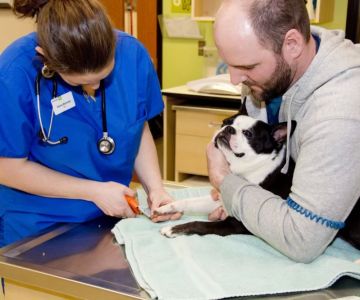1. Introduction: The Path to Becoming a Veterinarian
Becoming a veterinarian is a noble and rewarding career choice that requires a strong foundation in science, a passion for animals, and a commitment to lifelong learning. However, before you can care for animals and diagnose illnesses, you need to first determine what to study to make that dream a reality. If you’re considering becoming a veterinarian, understanding which major is best for you is crucial to setting you up for success in veterinary school.
In this article, we’ll walk you through the different educational requirements for aspiring veterinarians and explain what you need to major in to ensure a smooth path toward veterinary school and beyond. Whether you're just starting to think about this career or you're already planning your academic future, this guide will provide valuable insights into the academic journey to becoming a veterinarian.
2. What Majors Can Help You Become a Veterinarian?
While there is no single, specific major required to become a veterinarian, most aspiring veterinarians will choose a major that emphasizes science, particularly biology and chemistry. Veterinary schools typically require applicants to have a solid academic background in these subjects to ensure that they have the foundational knowledge necessary for success in their program.
2.1. Common Majors for Future Veterinarians
The most common majors for students pursuing veterinary school include:
- Biology
- Animal Science
- Pre-Veterinary Medicine
- Biochemistry
- Zoology
- Veterinary Technology (for those pursuing technician roles)
These majors typically focus on biological sciences, providing the knowledge needed to understand animal anatomy, physiology, and diseases. Some programs are more specialized, such as pre-veterinary programs, which tailor coursework specifically for future veterinary students. However, it is important to note that while these majors are common, veterinary schools do not have strict requirements for specific undergraduate degrees.
2.2. Is a Specific Major Required?
No, a specific major is not required for veterinary school, but certain majors tend to provide a stronger academic foundation. Most veterinary schools look for students who have completed specific prerequisite courses, such as:
- General Biology
- General Chemistry
- Organic Chemistry
- Physics
- Mathematics (including calculus or statistics)
- Animal Science
Choosing a major that allows you to complete these courses while gaining exposure to the world of animals and veterinary care will give you a competitive advantage during the application process.
3. Gaining Experience in the Field of Veterinary Medicine
In addition to your undergraduate major, hands-on experience in the veterinary field is crucial. Veterinary schools want to see that you have practical experience working with animals and that you are dedicated to this career path. Here are a few ways you can gain experience:
3.1. Volunteering at Animal Shelters
Volunteering at an animal shelter or animal rescue organization can give you the chance to work with a variety of animals and learn about their care. Shelters often welcome volunteers who are eager to assist with animal care, handling, and medical treatments, providing valuable experience in a veterinary setting.
3.2. Internships and Shadowing Veterinarians
Internships and shadowing experiences are incredibly valuable for gaining firsthand insight into the day-to-day responsibilities of a veterinarian. These opportunities allow you to observe veterinarians in action, learning how they handle medical cases, surgeries, and interactions with pet owners. Many veterinary schools recommend or require a certain number of hours spent shadowing veterinarians before applying to their programs.
3.3. Working with Livestock or Exotic Animals
Veterinary schools often value applicants who have experience working with different species, such as livestock or exotic animals. If you're interested in a career in large animal or exotic animal medicine, gaining exposure to these types of animals through internships, volunteering, or part-time jobs can strengthen your veterinary school application.
4. What Other Factors Should You Consider When Choosing Your Major?
While your major is an essential part of your academic preparation, there are other factors you should consider when planning your path to becoming a veterinarian. These include:
4.1. Academic Rigor
Veterinary school is challenging, so it’s essential to choose a major that will adequately prepare you for the rigors of veterinary education. Look for programs that offer solid coursework in biology, chemistry, and other core sciences. Challenging yourself academically in your undergraduate years will make it easier to handle the workload in veterinary school.
4.2. Opportunities for Research
If you have an interest in veterinary research, you may want to choose a major that provides opportunities for scientific study. Research in areas like animal diseases, genetics, and behavior can lead to breakthroughs that improve the lives of animals. Veterinary schools often look for applicants with research experience, as it demonstrates curiosity, problem-solving skills, and a passion for animal welfare.
4.3. Flexibility in Career Path
While veterinary medicine is a popular career choice, there are many different paths you can take within the field. Consider whether the major you choose provides opportunities for diverse career paths, including roles in research, education, animal welfare, or public health. The flexibility to specialize in a specific area of veterinary medicine can be an appealing aspect of this career.
5. Conclusion: Taking the First Step Toward Becoming a Veterinarian
Deciding to become a veterinarian is an exciting decision that requires a lot of dedication, hard work, and passion for animals. Choosing the right major is a crucial first step, as it helps to provide the foundation for your veterinary education. Whether you major in biology, animal science, or pre-veterinary medicine, make sure to gain hands-on experience, complete the necessary coursework, and stay committed to your long-term goals.
If you are ready to start your journey toward becoming a veterinarian, take the time to research veterinary programs, talk to admissions counselors, and consider the experiences that will set you up for success. And if you need guidance on veterinary-related products and services, visit Hidden Brook Veterinary to find the resources that can support your path to a successful veterinary career.











